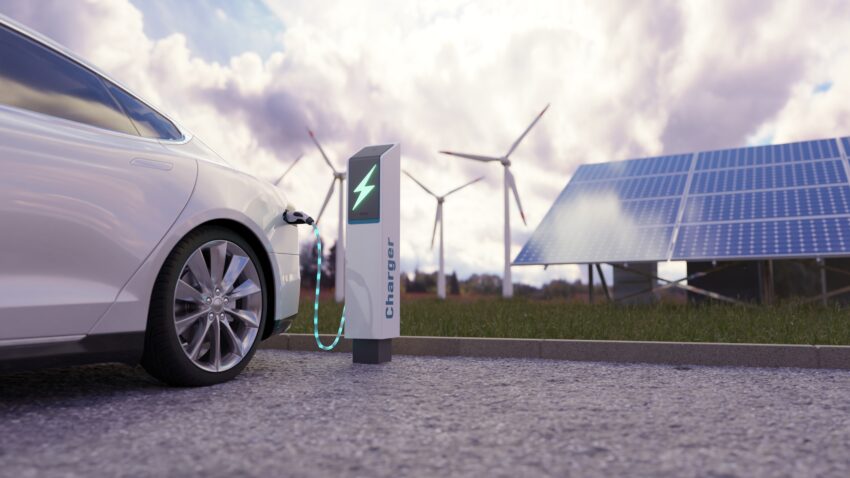As the world shifts towards cleaner energy solutions, solar-powered EV charging stations are emerging as a game-changer in sustainable transportation.
These stations combine solar energy with electric vehicle (EV) charging infrastructure, paving the way for a greener future. Innovations include solar-powered truck charging stations, which are becoming increasingly vital for sustainable logistics.
Read on to learn more what they are, the benefits they offer, and what the future holds for this exciting technology.
What are Solar-Powered EV Charging Stations?
Solar-powered EV charging stations are exactly what they sound like: charging stations that use solar panels to generate electricity needed to charge electric vehicles. They are equipped with photovoltaic panels that capture sunlight and convert it into electrical energy. The generated power is then used to charge EVs, reducing reliance on the grid and cutting down on greenhouse gas emissions.
Essentially, they combine the efficiency of solar energy with the convenience of EV charging, creating a sustainable solution for both energy and transportation.
Benefits of Solar-Powered EV Charging Stations
Solar-powered EV charging stations come with several advantages that make them a compelling choice for the future of transportation:
- Reduced Carbon Footprint: By utilizing renewable solar energy, these stations cut down on greenhouse gas emissions compared to traditional grid-powered charging stations.
- Energy Independence: Solar-powered stations can operate independently of the grid, providing a reliable source of power even in remote or underserved areas.
- Lower Operating Costs: Once installed, solar panels have low maintenance costs and can significantly reduce electricity bills over time.
- Increased Convenience: These stations can be set up in various locations, including parking lots and public spaces, offering more accessible charging options for EV owners.
The Future of Solar-Powered EV Charging Stations
The future of solar-powered EV charging stations looks promising as technology advances and demand for sustainable solutions grows. Here’s what we can expect:
Enhanced Efficiency with Advanced Solar Technology
Future solar-powered charging stations will benefit from innovations in solar panel technology, such as more efficient photovoltaic cells and improved energy storage solutions.
As solar technology continues to evolve, the efficiency of solar-powered EV charging stations is set to improve significantly. Here’s how advanced solar technology is enhancing the performance of these stations:
- Higher Conversion Rates: Newer photovoltaic cells, including those made from perovskite materials, offer higher energy conversion rates compared to traditional silicon-based cells.
- Improved Energy Storage: Advances in battery technology, such as solid-state batteries, are enhancing energy storage capabilities.
- Smart Solar Panels: The development of smart solar panels equipped with sensors and microinverters allows for better performance monitoring and optimization.
Integration with Smart Grids
Solar-powered EV charging stations will increasingly be integrated with smart grid technology. Here’s how this integration is enhancing the performance and reliability of these stations:
- Real-Time Energy Monitoring and Management: Smart grids provide real-time data on energy consumption and production. For solar-powered EV charging stations, this means that energy usage can be monitored continuously, allowing for better management of the available solar power.
- Dynamic Load Balancing: Smart grids can dynamically adjust the load on the electrical grid based on real-time demand and supply conditions. When solar-powered charging stations generate excess energy, smart grids can redistribute this surplus to other areas or store it for later use.
- Enhanced Energy Storage and Usage: Integration with smart grids facilitates advanced energy storage solutions, such as grid-connected batteries. These systems can store excess solar energy generated during peak sunlight hours and release it when solar production is low.
Expansion of Solar Charging Networks
The expansion of solar charging networks is crucial for making solar-powered EV charging stations more accessible and effective. As the adoption of electric vehicles (EVs) grows, the development of an extensive network of solar-powered charging stations becomes increasingly important.
Here’s how this expansion is set to transform the landscape:
- Increased Accessibility: As the network of solar-powered charging stations grows, it will become easier for EV owners to find convenient and accessible charging points.
- Solar Canopies in Parking Lots: One of the most visible expansions will be the installation of solar canopies over parking lots. These canopies not only provide shade and protection for vehicles but also generate solar power that can be used to charge EVs.
- Dedicated Solar Charging Hubs: The development of dedicated solar charging hubs is another key aspect of network expansion. These hubs will feature multiple charging stations powered entirely by solar energy, offering a centralized location for EV owners to charge their vehicles.
Conclusion
Solar-powered EV charging stations represent a significant step towards a more sustainable and efficient future for transportation. With their numerous benefits and the exciting advancements on the horizon, they are poised to play a crucial role in the global shift towards cleaner energy.
As technology evolves and the demand for eco-friendly solutions increases, these stations will become an integral part of the infrastructure that supports the next generation of electric vehicles.


